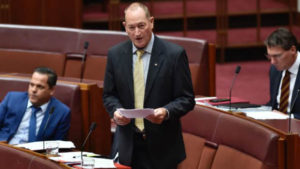Home » Commentary » Opinion » Anning is a Senator because of democratic will, not in spite of it
· SYDNEY MORNING HERALD

 In all the furore over Fraser Anning’s appalling maiden speech, a number of people have pointed out that he was elected on just 19 personal votes (one of the lowest individual counts in Queensland) as if this means he has no right to represent the state’s voters.
In all the furore over Fraser Anning’s appalling maiden speech, a number of people have pointed out that he was elected on just 19 personal votes (one of the lowest individual counts in Queensland) as if this means he has no right to represent the state’s voters.
It has become fashionable to claim someone “doesn’t represent me” when they say or do something deemed reprehensible.
For example, just a couple of dollars allows you to purchase a bumper sticker telling the world “Donald Trump isn’t my President”. America is one of the world’s leading democracies, and it seems also seeks to lead the world in undermining the trust in its own political system.
Such moral posturing might make you feel better about yourself but it’s wrong. Donald Trump is President, and Fraser Anning is a Senator for Queensland. They are there because of the democratic will of the voters, not in spite of it.
While there are good reasons to claim the Senate sometimes does a poor job of representing the will of the voters, the fact that a representative made an offensive speech isn’t a good one. Just because one elected official has reprehensible views does not mean the system is broken.
To deal first with the obvious: Anning’s low personal vote count means almost nothing. First, not only was Anning the third Pauline Hanson’s One Nation candidate on the ticket (most individual preference votes flow to the head of the party ticket), but the overwhelming majority of voters deliver their preferences above the line.
In Queensland almost 94% of voters at the 2016 election voted above the line. In practical terms that means more than 250,000 Queenslanders voted for PHON, and for good measure nearly 50,000 more voted for the Katter’s Australia Party (who Anning currently represents).
To put that in perspective: PHON alone received 60,000 more above the line votes than the total number of votes distributed to all candidates below the line. Basically, below the line votes are relevant only to policy nerds, family members, and as a matter curiosity.
This is materially different to the situation in the 2013 election where Western Australian Wayne Dropulich received just 108 individual votes. His party, the Australian Sports Party, also received a miniscule vote (just 2,997 votes total) and relied on an avalanche of harvested preferences to win a Senate seat (though this was annulled by the WA senate rerun).
This preference harvesting was dealt with by Senate voting reforms in 2016, which changed Senate voting to optional preferential voting above the line.
While this has undoubtedly made it harder for minor parties to be elected — notwithstanding the aberration caused by the 2016 double dissolution election — over time, it will probably make the Senate more reflective of the voters’ intention.
However, the Senate remains a proportional representation system. This gives voices outside the major parties a far greater chance of being elected, and also means the Senate will always have a greater diversity of political opinion.
Parties don’t have to convince a majority of voters — just enough to get a quota. At that point a party gets a seat, subject to constitutional eligibility, even if other voters vehemently disagree with you.
The flip side of this is that you don’t have to agree with someone to accept their democratic legitimacy and right to participate in the governance of the country. This week Greens Senator, Mehreen Faruqi, was sworn in as a Senator for NSW. I, along with many others, might disagree with the majority of the Greens policies, but that has no bearing on Faruqi’s legitimacy as a Senator.
Without seeking to draw any moral comparisons between Faruqi and Anning, we all need to be okay with saying Faruqi is my Senator and I disagree with her.
No democratic system anywhere in the world will deliver outcomes that exactly correspond with your world view. The appropriate response is to debate those you disagree with, convince those who are undecided, and condemn those who violate the shared values of our society. Too many seek to frustrate a duly elected government by any means.
The condemnation of Anning’s speech was quick, brutal and comprehensive. Though some have tried to spread the blame beyond Anning and his party, most of the commentary rightly noted that the abolition of race-based immigration is a bipartisan position and achievement.
I suspect most voters probably feel the same, but ultimately they will get the chance to give feedback on his position at the next election. Until then he is a Senator for Queensland, and I disagree with him.
We should be very careful about delegitimising our democratic process by virtue signalling, especially when evidence suggests the system actually responded pretty well to the challenge.
Simon Cowan is Research Director at the Centre for Independent Studies.
Anning is a Senator because of democratic will, not in spite of it